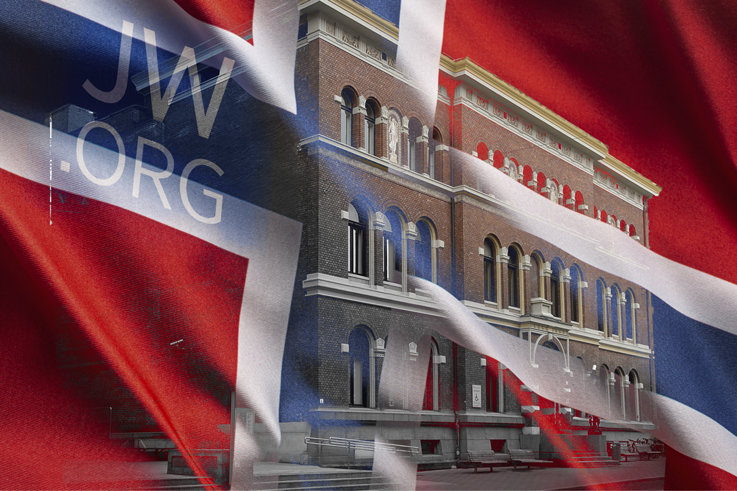
-
HOME
-
WHAT IS STANDOur Mission Our Values Our Help Contact
-
WHAT WE FIGHT FORReligious Freedom Religious Literacy Equality & Human Rights Inclusion & Respect Free Speech Responsible Journalism Corporate Accountability
-
RESOURCESExpert Studies Landmark Decisions White Papers FAQs David Miscavige Religious Freedom Resource Center Freedom of Religion & Human Rights Topic Index Priest-Penitent Privilege Islamophobia
-
HATE MONITORBiased Media Propagandists Hatemongers False Experts Hate Monitor Blog
-
NEWSROOMNews Media Watch Videos Blog
-
TAKE ACTIONCombat Hate & Discrimination Champion Freedom of Religion Demand Accountability
Norway Court of Appeal Affirms Jehovah’s Witnesses’ Right to Practice Their Religion
In what has since been called “the most important trial about a religious freedom issue in Norway in decades,” the Court of Appeal of Borgarting has reversed a 2024 decision denying state subsidies and registration to the Jehovah’s Witnesses of that nation.

The ruling brings to an end a saga that began in January 2022 when Oslo County Governor Valgerd Svarstad Haugland determined that the religion’s practices were “exclusionary” and therefore violated Norway’s Religious Communities Act—Section 2 of which reads: “No one may bind himself legally to belonging or not belonging to a religious community, religious organization or order. Nor may anyone bind another person to such a body.”
Using that clause as a justification, Haugland denied the group’s applications for state grants. For decades, the Jehovah’s Witnesses had relied on their $1.5 million annual grants for humanitarian disaster relief work and for expenses related to translating literature and construction of Kingdom Halls.
“There are more and more attempts in Europe by state institutions to interfere and intrude into the teachings and practices of religious groups, which is forbidden by the European Convention.”
Haugland objected to what she claimed was the religion’s practice of counseling members not to associate with ex-members who have been expelled or who have voluntarily left the group, arguing that this practice would make a person uncomfortable about departing the religion and therefore represents “negative social control.”
The Jehovah’s Witnesses appealed the decision, but the decision was upheld, prompting the religious community to file suit against the government in December 2022. Clarifying the organization’s practices, Jarrod Lopes, a spokesperson for the religion, said: “Congregation elders do not police the personal lives of congregants, nor do they exercise control over the faith of individual Jehovah’s Witnesses.”
The religion, now denied its national registration in Norway, not only lost its grants but also no longer had the rights and privileges of a religious community, including the right to solemnize marriages.
Jehovah’s Witnesses now had the grim prospect of being a faith with no funding to carry on its mission, and of its young couples now being forced to choose between a marriage ceremony in another faith or to enter that holy state through secular means.
Besides confronting a future of imminent extinction, Jehovah’s Witnesses also faced a present of prejudice and hate-fueled violence.
In September 2022, a man screamed as he attempted to assault two Jehovah’s Witnesses in Harstad. That same month, a Jehovah’s Witnesses mobile display car was set on fire, and in October, an attempted arson attack targeted a Jehovah’s Witnesses facility in Fauske.
The Jehovah’s Witnesses appealed yet again, now to the Court of Appeal, and on March 14, 2025, in a triumph for religious freedom, the three-judge court unanimously reversed the district court’s decision, finding no violation in the group’s practice of exclusion of ex-members.
Willy Fautré, director of the Brussels-based Human Rights Without Frontiers, who had characterized the face-off between the Jehovah’s Witnesses and Norway as “the most important trial about a religious freedom issue in Norway in decades,” observed that “there are more and more attempts in Europe by state institutions to interfere and intrude into the teachings and practices of religious groups, which is forbidden by the European Convention. The risk is they would open the door to more court cases against other religious groups.”
Italian sociologist of religions Massimo Introvigne hailed the Appeal Court’s decision as being in line with similar decisions rendered in other democracies as well as by the European Court of Human Rights. “It may constitute an important precedent for other countries unwisely considering [acting] against the Jehovah’s Witnesses because of their exclusion policy, which is clearly protected by international provisions on freedom of religion or belief,” he said.
As for the Jehovah’s Witnesses, “We are happy with the fair decision of the Court of Appeal, which upholds the rights and restores the good reputation of thousands of Norwegian citizens who profess the faith of Jehovah’s Witnesses,” wrote Jørgen Pedersen, spokesperson for the Jehovah’s Witnesses Information Department in Scandinavia. He believes the decision represents a significant victory for all citizens in Norway, as it confirms the fundamental rights to freedom of religion and freedom of expression.
“We sincerely hope that this judgment will further strengthen Norway’s reputation as a nation that embraces religious diversity.”





